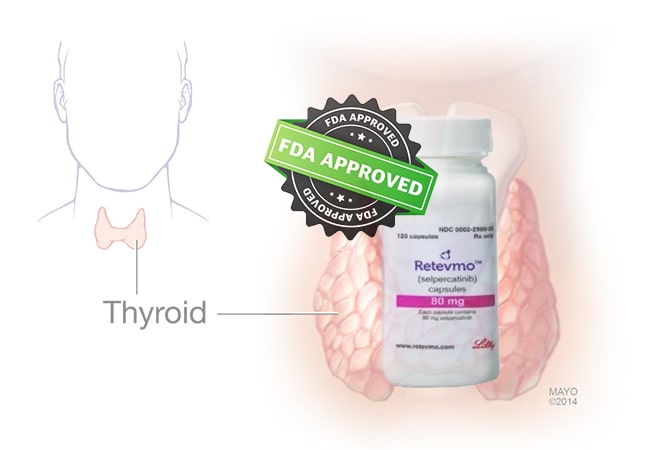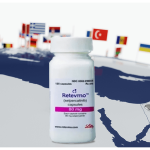On May 29, 2024, the U.S. Food and Drug Administration (FDA) announced the accelerated approval of selpercatinib (Retevmo), developed by Eli Lilly and Company, for pediatric patients aged two years and older. This approval applies to children with advanced or metastatic medullary thyroid cancer (MTC) harboring a RET mutation, advanced or metastatic thyroid cancer with a RET gene fusion, and locally advanced or metastatic solid tumors with a RET gene fusion. These conditions must be identified through an FDA-approved test and necessitate systemic therapy.
This landmark decision is notable as it marks the first FDA approval of a targeted therapy specifically for pediatric patients under 12 years old with RET alterations. Previously, selpercatinib received accelerated approval for thyroid cancer indications in both adults and pediatric patients aged 12 and older, as well as for solid tumor indications in adults.
The efficacy of selpercatinib in younger patients was demonstrated in the LIBRETTO-121 clinical trial (NCT03899792). This international, single-arm, multi-cohort study evaluated patients who received selpercatinib at a dose of 92 mg/m² orally twice daily. Treatment continued until disease progression, unacceptable toxicity, or another reason for discontinuation. The primary efficacy population included 25 patients aged 2 to 20 years with locally advanced or metastatic RET-activated solid tumors that were unresponsive to existing therapies or had no standard curative options.
Key efficacy outcomes of the trial included the confirmed overall response rate (ORR) and duration of response (DOR). The ORR, as assessed by a blinded independent review committee using RECIST 1.1 criteria, was 48% (95% CI: 28%, 69%). The median DOR was not reached (95% CI: not evaluable [NE], NE), with 92% of responders maintaining their response at the 12-month mark. Notably, significant and durable responses were seen in patients with RET-mutant MTC (n=14; ORR 43% [95% CI: 18%, 71%]) and RET fusion-positive thyroid cancer (n=10; ORR 60% [95% CI: 26%, 88%]).
The most common side effects (≥25%) included musculoskeletal pain, diarrhea, headache, nausea, vomiting, coronavirus infection, abdominal pain, fatigue, fever, and hemorrhage. Frequent Grade 3 or 4 laboratory abnormalities (≥5%) were decreased calcium, decreased hemoglobin, and decreased neutrophil levels.
For pediatric patients aged 2 to less than 12 years, the recommended dose of selpercatinib is based on body surface area. For those aged 12 years and older, dosing is based on weight. Detailed dosing guidelines are available in the prescribing information.
LIBRETTO-121 was carried out under a pediatric Written Request (WR) as part of the Best Pharmaceuticals for Children Act (BPCA). The FDA’s assessment process was facilitated by the Assessment Aid, a voluntary submission from the applicant.
This approval provides a new and much-needed targeted treatment option for young patients with challenging RET-altered cancers, representing a significant advancement in the field of pediatric oncology. Full prescribing information for Retevmo will be available online, offering healthcare providers detailed guidance on its use.
Reference: https://www.fda.gov/drugs/resources-information-approved-drugs/fda-grants-accelerated-approval-selpercatinib-pediatric-patients-two-years-and-older-ret-altered






